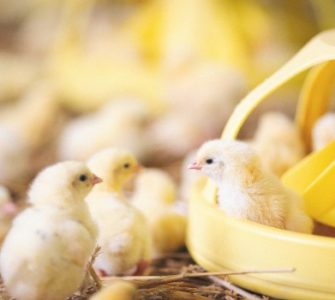Early infectious bronchitis virus infection causes more severe false layer syndrome
Exposure to infectious bronchitis virus (IBV) has been linked with cases of the poultry reproductive disease false layer syndrome,1 where large cysts in the oviduct prevent birds from laying eggs. New research suggests that the earlier birds are challenged with the virus, the more severe the symptoms can be.
A two-phase project by University of Georgia College of Veterinary Medicine researchers first examined the impact of challenge early in birds’ lives, then looked at the effect of vaccination in combination with that early infection.
“We found in our first study that birds that are challenged at a younger age had more severe reproductive disease,” explained Adrea Mueller Slay, DVM and PhD student, who led the work.
“Typically, in the field when false layer syndrome is detected in a flock, a company might opt to add a vaccination at the hatchery. Our goal was to replicate that and see if adding a vaccination at the hatchery really would provide any benefits.”
High viral loads, maternal antibodies influence results
The results of the second part of the work came as a surprise, Mueller Slay said, with levels of protection from hatchery vaccination not as high as expected.
The large challenge load used in the study is one factor that may have caused this finding, she suggested, while the use of specific-pathogen-free (SPF) chickens, which don’t have maternal antibodies against IBV, may also have played a part. The latter aspect is providing the impetus behind new research.
“We’re collaborating with some people out in California to investigate the role of maternal antibodies and the development of false-layer syndrome,” she explained.
“One difference between birds we see in the field and birds in our experiments is we’re using SPFs. This next study is going to focus on looking at the difference between vaccinated and unvaccinated, with and without maternal antibodies, and see if there’s any differences in their development of the disease.”
Good biosecurity improves outcomes
While understanding the variable response of birds to pathogen challenge and vaccination is important, getting the basics right on poultry production sites is pivotal to reducing risks, Mueller Slay continued.
“I think biosecurity is one of the most important things that we can focus on. Both age of infection, but also challenge load, are extremely important as to whether or not your birds are going to develop false layer syndrome. And the more you can ensure that those birds are receiving a lower challenge load, the better,” she added.
1 da Silva AP, Giroux C, Sellers HS, Mendoza-Reilley A, Stoute S, Gallardo RA. Characterization of an infectious bronchitis virus isolated from commercial layers suffering from false layer syndrome. Avian Dis. 2021;65(3):373-80.
Posted on December 22, 2021

















